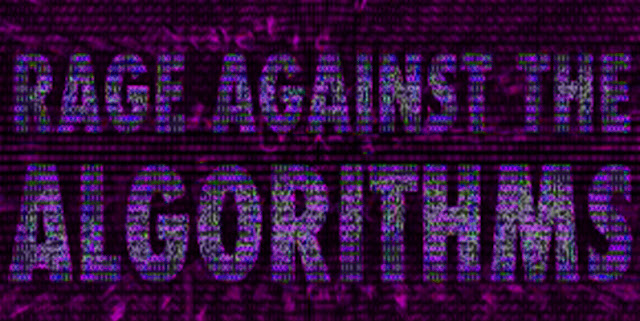Vol. 112 (2021)
By THIRSTY
[Ed. This column first appeared in the January 2012 issue of Stay Thirsty Magazine. Ten years later, its relevance is self-evident.]
Corporations have them. Governments have them. Scientists have them. Retailers have them. Banks have them. Securities markets have them. Oddsmakers have them. Search engines have them. They all have algorithms that mine data, predict outcomes, use sophisticated mathematical modeling to forecast the future and track human behavior. The world is engulfed by invisible strings of numbers and unseen lines of computer code that control the "backroom" operations of modern life. Everyone has algorithms, except real people.
Today, giant corporations control much of our contemporary life. Beyond providing the things we consume, these corporations bombard our daily existence with an ever-increasing barrage of advertising and a constant imperative to buy. Their amplified messages have become so commonplace that most people simply do not realize the meta-forces at work.
Harnessing the power of information generated by interacting with real people, corporations, banks, insurance companies and the government have moved down the road to being the arbiter of our personal freedoms. Data mining, a science and an industry that has grown exponentially over the past decade, makes going to the mall and using your credit card a free source of critical information to the credit card companies about your personal habits – stores you like, products you buy, places where you eat lunch and even what you had for lunch. Every time a person ventures out into the world and uses a credit card, it is like a trail of breadcrumbs leading into one’s private psyche.
Even the "cool hunters" of only a few years ago – individuals who hunt the next big trend by wandering around urban areas looking for cool people or "mavens" – seem archaic by today's standards. This "cool hunting" now takes place on Facebook and Twitter and wherever else people, especially younger people, discuss their likes and dislikes. Those seemingly unencumbered interactions ironically provide the personal data that can be mined and interpreted by algorithms that predict what is culturally worthwhile and what is not, what will be profitable or not.
But the dark side of these algorithms is that they can be manipulated, tailored for specific outcomes and communicated seamlessly and relentlessly to the target audience. What was once meant to promote new products or forms of art and free expression is now a means to further energize popular appeal for what is already popular or for what a corporation feels should be popular. Communications that appear to be custom-tailored to each individual are just clear manipulations of data gleaned from your interactions with society.
The loss of personal privacy is happening at light speed and it is time this issue comes to the forefront. People’s lives are being watched, counted, categorized and controlled by the unseen, unsleeping and unfeeling mathematic formulas that roam the globe without regulation or regard for personal liberty. In time, unchecked, the algorithms and the corporations and governments that control them will effectively block independent voices from being heard.
Link:
Rage Against the Algorithm (January 2012)


